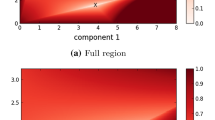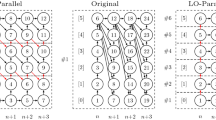Abstract
Very recently, a novel class of parallelizable high-order time discretization schemes has been introduced in Schütz et al. (J Sci Comput 90(54):1–33, 2022). In this current work, we analyze the stability properties of those schemes and introduce a small but effective modification which only necessitates minor modifications of existing implementations. It is shown how this modification leads to A(\(\alpha \))-stable schemes with \(\alpha \) being close to \(90^{\circ }\). Numerical examples illustrate an additional favorable influence of this modification on the accuracy of those schemes.







Similar content being viewed by others
References
Aiguobasimwin, I.B., Okuonghae, R.I.: A class of two-derivative two-step Runge–Kutta methods for non-stiff ODEs. J. Appl. Math. Article ID 2459809, 9 (2019)
Butcher, J.C.: On the convergence of numerical solutions to ordinary differential equations. Math. Comput. 20, 1–10 (1966)
Butcher, J.C., Hojjati, G.: Second derivative methods with RK stability. Numer. Algorithms 40(4), 415–429 (2005)
Chan, R., Tsai, A.: On explicit two-derivative Runge–Kutta methods. Numer. Algorithms 53, 171–194 (2010)
Christlieb, A.J., Gottlieb, S., Grant, Z.J., Seal, D.C.: Explicit strong stability preserving multistage two-derivative time-stepping schemes. J. Sci. Comput. 68, 914–942 (2016)
Dittmann, A.J.: High-order multiderivative IMEX schemes. Appl. Numer. Math. 160, 205–216 (2021)
Dutt, A., Greengard, L., Rokhlin, V.: Spectral deferred correction methods for ordinary differential equations. BIT. Numer. Math. 40(2), 241–266 (2000)
Gekeler, E.W.: On implicit Runge–Kutta methods with higher derivatives. BIT 28, 809–816 (1988)
Godlewski, E., Raviart, P.A.: Hyperbolic Systems of Conservation Laws. Ellipses Paris (1991)
Gottlieb, S., Grant, Z.J., Hu, J., Shu, R.: High order strong stability preserving multiderivative implicit and IMEX Runge–Kutta methods with asymptotic preserving properties. SIAM J. Numer. Anal. 60(1), 423–449 (2022)
Hairer, E., Norsett, S.P., Wanner, G.: Solving Ordinary Differential Equations I. Springer Series in Computational Mathematics (1987)
Hairer, E., Wanner, G.: Solving Ordinary Differential Equations II. Springer Series in Computational Mathematics (1991)
Jaust, A., Schütz, J., Seal, D.C.: Implicit multistage two-derivative discontinuous Galerkin schemes for viscous conservation laws. J. Sci. Comput. 69, 866–891 (2016)
Kastlunger, K., Wanner, G.: On Turan type implicit Runge–Kutta methods. Computing 9, 317–325 (1972)
Okuonghae, R.I., Ikhile, M.N.O.: L(\(\alpha \))-stable multi-derivative GLM. J. Algorithms Comput. Technol. 9(4), 339–376 (2015). https://doi.org/10.1260/1748-3018.9.4.339
Ong, B.W., Spiteri, R.J.: Deferred correction methods for ordinary differential equations. J. Sci. Comput. 83(3), Paper No. 60, 29 (2020)
Schütz, J., Seal, D.: An asymptotic preserving semi-implicit multiderivative solver. Appl. Numer. Math. 160, 84–101 (2021)
Schütz, J., Seal, D.C., Zeifang, J.: Parallel-in-time high-order multiderivative IMEX solvers. J. Sci. Comput. 90(54), 1–33 (2022)
Seal, D., Güçlü, Y., Christlieb, A.: High-order multiderivative time integrators for hyperbolic conservation laws. J. Sci. Comput. 60, 101–140 (2014)
Stroud, A.H., Stancu, D.D.: Quadrature formulas with multiple Gaussian nodes. SIAM J. Numer. Anal. 2, 129–143 (1965)
Turacı, M.Ö., Öziş, T.: Derivation of three-derivative Runge–Kutta methods. Numer. Algorithms 74(1), 247–265 (2017)
Turán, P.: On the theory of the mechanical quadrature. Acta Universitatis Szegediensis Acta Scientiarum Mathematicarum 12, 30–37 (1950)
Zeifang, J., Schütz, J.: Two-derivative deferred correction time discretization for the discontinuous Galerkin method. arXiv preprint arXiv:2109.04804 (2021)
Acknowledgements
J. Zeifang was funded by the Deutsche Forschungsgemeinschaft (DFG, German Research Foundation)—Project No. 457811052. D. Seal was funded by the Office of Naval Research, Grant Number N0001419WX01523 and N0001420WX00219. The computing resources and services used in this work were provided by the VSC (Flemish Supercomputer Center), funded by the Research Foundation—Flanders (FWO) and the Flemish Government.
Author information
Authors and Affiliations
Corresponding author
Additional information
Communicated by Christian Lubich.
Publisher's Note
Springer Nature remains neutral with regard to jurisdictional claims in published maps and institutional affiliations.
Rights and permissions
About this article
Cite this article
Zeifang, J., Schütz, J. & Seal, D.C. Stability of implicit multiderivative deferred correction methods. Bit Numer Math 62, 1487–1503 (2022). https://doi.org/10.1007/s10543-022-00919-x
Received:
Accepted:
Published:
Issue Date:
DOI: https://doi.org/10.1007/s10543-022-00919-x




